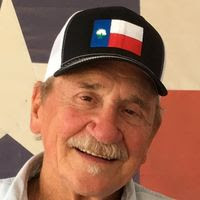Merry Christmas everyone! Here’s wishing the best of holiday cheer to each and every one of you! The approach of Christmas takes me back to an earlier time in my life and reminds me of the Christmas Trades Day Drawing that used to be the Grand Finale of the year for the Roscoe Trades Day Association.
Anyone living in or around Roscoe in the 1950s will remember the weekly Trades Day drawings that were held in the open area where the Roscoe State Bank now stands. Every time you bought something from a participating Roscoe merchant—and that was practically all of them—you got a yellow ticket for every dollar you spent. So, if you bought something for $5.25, the merchant was supposed to give you five yellow tickets, but they would always round up and give you six. Each ticket had a number on it with a detachable stub.
Then on Friday afternoons at four o’clock, William Haney and one of his “soda jerks” from the drug store would set up a table just outside the south wall of the Boys Club hall and put on top of it a big turning “squirrel cage” type barrel made of wood and chicken wire. They also hooked up a mike and speakers for Mr. Haney to do the announcing. While this was going on, a huge crowd of Roscoe and country folks would gather with tickets in hand, filling the lawn area where the bank and its parking lot now stands. Someone then put all the ticket stubs accumulated from sales all over town that week into the barrel, which was turned over and over.
Then a kid randomly selected from the crowd opened the little door, reached in, and drew out a stub. Mr. Haney would announce the amount of the prize and then call out the numbers on the stub, and all assembled would carefully check through their tickets. The lucky winner would yell, “I’ve got it!” and go up to the table to collect the prize. On normal weeks there were three—first $10, then $15, and then to top off the day, a $25 prize. Of course, this was in the ‘50s, so $10 was a substantial amount of money, enough to make anyone who won it feel like it was their lucky week. The prize money wasn’t cash but trades day script redeemable in any participating store, but since practically all the Roscoe businesses participated and since people did most of their shopping in Roscoe, the coupons were as good as cash.
When the weekly drawing was over, people didn’t throw their yellow tickets away because you could trade in fifty yellow tickets for one red ticket, and the red tickets were used for the Grand Finale drawing of the year that took place the week before Christmas. The Roscoe Times Office handled all the tickets, so when merchants ran out of yellow ones, they came around to the Times Office to get more. Also, as Christmas approached, people came to the Times Office and “cashed in” all their yellow tickets to get the red ones.
The biggest prize ever given away at one of the Trades Day drawings was a brand spanking new Chevrolet. This would have been around 1955 or 1956. Back then, Bill Pollard had his Chevrolet dealership on the northwest corner of Main and Broadway, just east of the Coffee Bar and across the street from Kirby Smith’s filling station. He did a thriving business, not just in Roscoe, but for the whole area. In fact, he was so successful that his dealership outgrew Roscoe, and he moved to Big Spring and was successful out there for many years.
The drawings went on for several years after that, but there was never again any prize as big as that one. I think in later years, the grand prize at the Christmas drawing was something like $100, but again, that was a lot of money for those days.










No comments:
Post a Comment